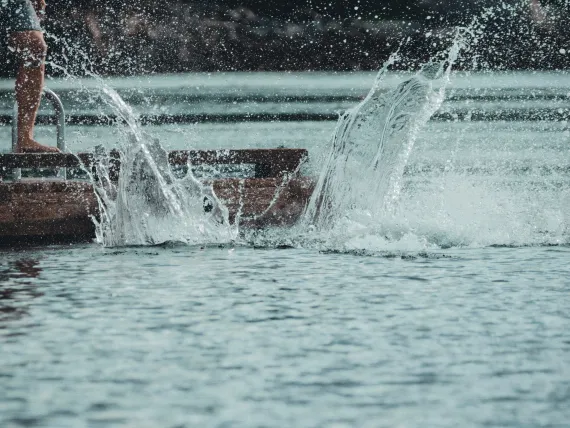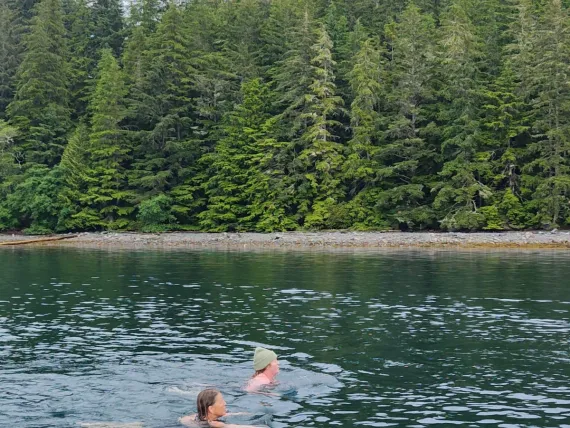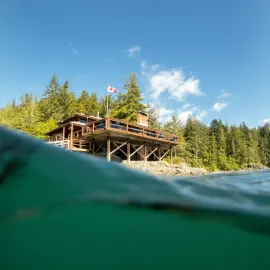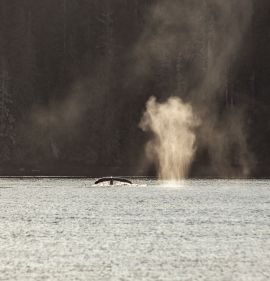The Surprising Benefits of Cold Water Swimming
Why you should say yes to the 5pm swim!
Cold-water swimming has recently gained a dedicated following, from elite athletes to wellness enthusiasts and even Farewell Harbour guests! At first glance, the idea of plunging into icy waters may seem more like a dare from Tim than a therapeutic practice. But increasingly, scientific research is revealing that cold-water swimming is more than just a bold way to "shock" your body; it can provide significant health benefits, from boosting your immune system to improving mental health and accelerating muscle recovery.
So, what's the appeal of cold-water swimming? Why are so many people choosing to plunge into freezing lakes or ocean water?


What is Cold Swimming?
Cold-water swimming involves immersing your body in water that is colder than your normal body temperature, typically below 15°C (59°F). This can be done in natural bodies of water such as lakes, rivers, or the ocean or in man-made cold plunges and ice baths. In many cultures, cold swimming has been practiced for centuries, often as part of traditional rituals or wellness routines.
For example:
- In Finland and other Nordic countries, sauna bathing followed by a quick dip in icy lakes or rivers is a long-standing tradition. It is said to invigorate both body and mind.
- In Russia, cold-water swimming is a typical winter activity, and it is believed to provide health benefits and boost longevity.
- Polar plunges or "ice dips" are increasingly popular among people seeking a challenging, refreshing experience that connects them with nature (hint hint).
The Science Behind Cold Swimming
The benefits of cold swimming are thought to arise from several physiological processes that are triggered when the body is exposed to cold water. Here's what happens when you dive into the ocean or take an ice-cold plunge:
- Vasoconstriction and Vasodilation: When your body is exposed to cold water, the blood vessels near your skin constrict (vasoconstriction), reducing blood flow to the surface of the skin in an effort to preserve core body heat. Once you leave the cold water, your body experiences vasodilation, where blood vessels expand and increase blood flow to the skin and muscles, delivering oxygen and nutrients that promote healing and recovery.
- Activation of Brown Fat: Cold exposure has been shown to activate brown adipose tissue (brown fat), a type of fat that helps the body burn energy to generate heat. This process can help boost your metabolism and improve fat-burning efficiency.
- Endorphin Release: Cold-water immersion triggers the release of endorphins, the body's natural painkillers and mood-boosting hormones. This "feel-good" response can lead to a sense of euphoria or "high" after a cold swim, which many people describe as addictive.
- Improved Circulation: Cold swimming causes a temporary shock to the cardiovascular system, which, over time, can improve circulation and heart health by strengthening blood vessels and increasing the efficiency of the circulatory system.


The Top Benefits of Cold Swimming
Now that we understand the science behind cold-water immersion, let's dive into the numerous benefits that cold swimming can offer:
Boosts Immune Function
Regular exposure to cold water may stimulate the immune system, increasing the production of white blood cells and boosting your body's ability to fight off infections. Studies have shown that cold exposure can lead to increased production of specific immune cells, which may help reduce the incidence of illness.
Reduces Muscle Soreness and Inflammation
Athletes often turn to cold-water immersion to aid muscle recovery after intense exercise. The cold helps reduce inflammation, alleviate soreness, and accelerate recovery by constricting blood vessels and flushing waste products like lactic acid. Many sports teams use ice baths to help athletes recover quickly after training sessions and competitions.
Improves Mental Health
Cold swimming has been shown to improve mood and reduce symptoms of anxiety and depression. The cold shock triggers the release of neurotransmitters like dopamine, which help improve focus, reduce stress, and enhance overall well-being. For many, cold-water swimming has become a way to "reset" their mental state and escape from the daily grind. There is more research needed on this but there seems to be a correlation between a positive mental state and consistency of cold-water swimming.
Increases Energy and Alertness
A dip in cold water stimulates the body’s sympathetic nervous system, which is responsible for the "fight or flight" response. This leads to an immediate surge of energy and heightened alertness. After emerging from the cold water, many swimmers report feeling more awake, focused, and ready to take on the day. It’s often considered a natural energy booster, making it a great way to kickstart your morning routine.
Enhances Sleep Quality
Although it might seem counterintuitive, cold exposure can improve your sleep quality. The body’s ability to regulate temperature is crucial for falling asleep, and cold water immersion helps to regulate body temperature. After a cold swim, the body works to warm itself back up, signalling to the brain that it's time to rest, leading to deeper, more restorative sleep.
Strengthens Resilience and Mental Toughness
Taking the plunge into cold water is no easy feat, especially when temperatures are at their lowest. Over time, regular cold-water swimmers report feeling more resilient and mentally demanding as they learn to embrace discomfort and push through the initial shock. This mental fortitude can translate into other areas of life, helping individuals tackle challenges with stronger determination.

Builds Community
Our cold plunge each evening has become a communal event. It is a long-standing tradition at Farewell Harbour to jump off the end of the dock each evening, and whoever feels brave enough can join! Even if you don’t get into the water, we have people on the dock cheering, staff ready with a high five, and it has brought people together even if they only met a few hours before. It is infectious! There is a reason that years later, we are still jumping into the cold water each evening at 5 pm.

How to Get Started with Cold Swimming
If you're new to cold swimming and want to try it for yourself, here are some tips to ensure you start safely and are ready for the 5 o clock swim club when you visit Farewell Harbour Lodge:
-
Start Slow: Begin with shorter exposure times (e.g., 30 seconds to a minute) in water that's not too cold, and gradually increase the duration and intensity of your cold swims as your body adapts.
-
Stay Safe: Always swim with a buddy, especially in natural bodies of water. Be aware of potential risks, such as hypothermia and cold shock. Avoid swimming alone in extreme cold conditions, and always monitor your body’s responses closely.
-
Warm Up Gradually: After swimming, it's important to warm your body back up slowly. Use a dry towel, warm clothes, and possibly a hot drink to gradually raise your body temperature. Avoid hot showers right after cold swimming, as this can shock your system.
-
Listen to Your Body: Cold swimming is not for everyone, and it's essential to listen to your body. If you feel faint, dizzy, or excessively cold, get out of the water immediately and warm up.
Cold swimming is not just a challenging experience—it's a rejuvenating one. With its long list of potential health benefits, including improved circulation, mental clarity, muscle recovery, and enhanced resilience, it’s easy to see why more people are embracing the chill. Whether you're seeking physical recovery or a mental reset, cold-water immersion offers a unique way to reconnect with nature and your own body.
So, if you’ve ever considered taking the plunge, remember that the initial shock may be intense, but the rewards are well worth it. Just be sure to ease into the practice, listen to your body, and enjoy the refreshing, invigorating effects of your cold-water swim.
We look forward to seeing you on the dock at 5pm!
By: Rebecca Crilly



































